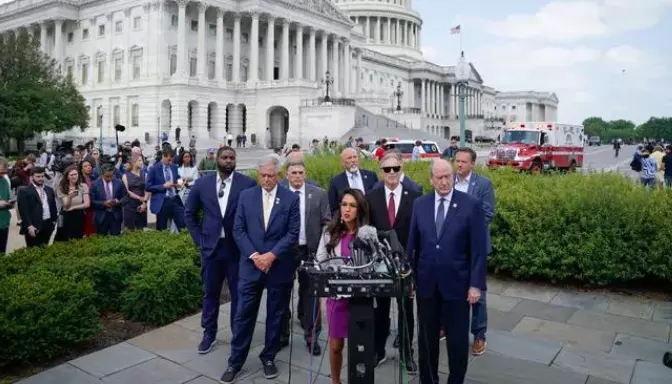Diksia.com - In a stunning turn of events, Speaker Kevin McCarthy finds himself at odds with the right-wing faction of his party following his recent agreement with President Joe Biden to suspend the debt ceiling.
As the House prepares for a crucial vote on the matter, a rebellion has emerged within the ranks of the House Freedom Caucus, comprised of approximately 45 hard-line conservatives.
These members have expressed their refusal to support the bill, known as The Fiscal Responsibility Act, criticizing McCarthy for what they perceive as a compromise that falls short of significant spending cuts.
This perceived compromise is seen by them as a “betrayal” of McCarthy’s previous commitment to their caucus.
Representative Dan Bishop of North Carolina has even contemplated a push to remove McCarthy from his position as Speaker, stating, “It is inescapable to me. It has to be done”.
Meanwhile, Representative Scott Perry of Pennsylvania, the chair of the Freedom Caucus, has not ruled out pursuing such an ouster.
Notably, many of the detractors within the party are the same Republicans who initially opposed McCarthy’s speakership back in January but eventually rallied behind him after securing undisclosed concessions.
Representative Lauren Boebert of Colorado, a member of the Freedom Caucus, decried the upcoming bill as a collection of “fake news and fake talking points” that fails to address the issue of out-of-control federal spending.
She emphasized that if Republicans were to vote in line with their campaign promises, they would reject this unfavorable deal.
McCarthy now finds himself scrambling to maintain the support of the moderate members of the Republican caucus, as their backing is crucial to passing the debt ceiling package and avoiding a potential default by June 5.
Additionally, the pressure is mounting on the White House to ensure that a majority of Democrats vote in favor of the bill.
The ongoing revolt within the Republican Party and the impending “reckoning” The deal struck between President Biden and McCarthy aims to suspend the debt ceiling until the end of 2024, while also maintaining flat discretionary spending for the next year and capping spending with a modest 1% increase in 2025.
However, Representative Chip Roy of Texas, joined by nine other members of the Freedom Caucus, firmly asserted, “I want to be very clear: Not one Republican should vote for this deal. Not one.”.
He labeled it a “bad deal,” emphasizing that the American people did not send their representatives to Congress to borrow an additional $4 trillion without gaining any substantial benefits in return.
The House Freedom Caucus consists of many Republicans who were elected in recent cycles and align themselves with former President Donald Trump.
They believe they have a mandate to challenge the establishment in Washington, D.C. Roy went on to express his disappointment, calling the deal a “complete and total sellout” that betrays the power-sharing arrangement struck with McCarthy during the speakership negotiations.
Numerous hard-line conservatives are upset that the debt-ceiling suspension is based on post-pandemic spending levels rather than a return to pre-pandemic norms.
Roy warned, “No matter what happens, there will be a reckoning by what just occurred.”
Echoing Roy’s sentiments, Representative Andy Biggs of Arizona condemned the deal as “one of the biggest abominations” he has witnessed during his tenure in Washington, D.C. Perry, meanwhile, accused McCarthy of failing to stand firm in negotiations with Biden, vowing that his caucus will do everything in their power to halt the bill.
Will McCarthy and Biden secure enough votes? Initially, McCarthy claimed that 95% of the Republican conference supported the legislation following the deal reached over the weekend. However, that assertion has proven to be wildly inaccurate.
During an appearance on “Fox and Friends” on Tuesday morning, McCarthy acknowledged that he planned to meet with Freedom Caucus lawmakers.
In defense of the debt ceiling bill, he compared it to previous deals passed under Republican control, noting that those agreements did not include any spending cuts whatsoever.
McCarthy asserted, “This is the biggest cut in American history that we [will] vote for.”
While the Freedom Caucus alone lacks the votes to block the bill’s passage, the situation becomes considerably more precarious for McCarthy if moderate Republicans also refuse to back it.
Representative Nancy Mace of South Carolina, who has referred to herself as a “caucus of one” within the House GOP, announced that she will vote against the legislation, declaring, “Washington is broken.
Republicans got outsmarted by a President who can’t find his pants.
I’m voting NO on the debt ceiling debacle because playing the DC game isn’t worth selling out our kids and grandkids.”
With the growing number of Republican opponents, McCarthy and Biden may have to rely on House Democrats to secure the bill’s passage.
However, that is far from guaranteed, as members of the House Progressive Caucus have criticized the bill for its expansion of work requirements for food stamps and expedited permitting for oil and gas projects.
President Biden, when asked whether he believed the debt ceiling bill would pass Congress, expressed optimism, saying, “I feel very good about it.”
The potential implications for McCarthy’s speakership When questioned about the possibility of Freedom Caucus members seeking to remove McCarthy from the speakership, Representative Perry emphasized that their immediate focus remains on defeating the bill.
However, he added, “We will decide once we’ve determined the disposition of the bill and the finality.”
It is worth noting that individual lawmakers’ threats now carry more weight after McCarthy agreed earlier this year to allow a single member to call for a vote to oust the speaker.
Nevertheless, a majority of the House would still be required to remove McCarthy from his position.
In order to secure his speakership, McCarthy made concessions to members of the Freedom Caucus, including granting them committee assignments on influential panels like the House Rules Committee, responsible for bringing legislation to the House floor.
Notably, Representatives Ralph Norman of South Carolina and Chip Roy, both Freedom Caucus members who opposed McCarthy’s speakership bid, serve on the House Rules Committee.
The contents of the debt ceiling bill Beyond the suspension of the debt ceiling and the implementation of spending caps, the bill includes revisions to the Supplemental Nutrition Assistance Program.
It introduces time limits for able-bodied adults aged 54 or younger without dependent children, linking their eligibility for food stamps to specific work requirements.
The deal also imposes additional work requirements for recipients of the Temporary Assistance for Needy Families program but does not make any changes to Medicaid, as Biden had expressed his opposition to such alterations.
Furthermore, the bill rolls back $10 billion of the $80 billion in IRS funding previously approved in Biden’s Inflation Reduction Act, intended to crack down on tax evasion by wealthy individuals and corporations.
It also reallocates unspent COVID-19 relief funds approved during the presidencies of both Biden and Trump.
Notably, the legislation does not include any new tax increases targeting the wealthy and corporations, as proposed by Biden.
It also does not revoke the Inflation Reduction Act or the student loan forgiveness program, both of which had been sought by many Republicans.






